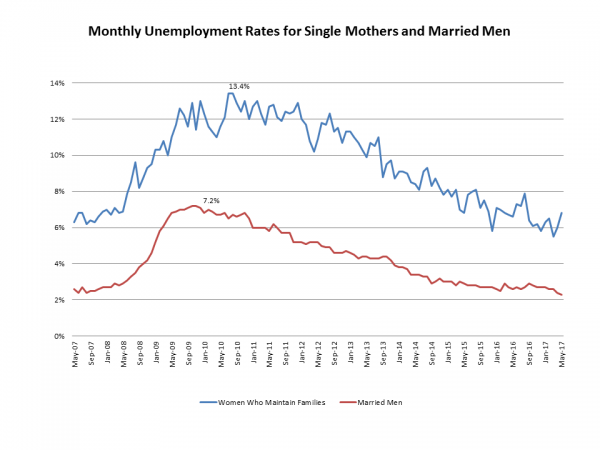Abortion rights, women of color, and LGBTQIA+ people are under attack. Pledge to join us in fighting for gender justice.
Single Mothers are Hustling – and Need Policies that Work for Them

Jobs data were released this morning by the Bureau of Labor Statistics (BLS). And while the economy added 138,000 jobs and the overall unemployment rate remained low at 4.3 percent, these numbers often mask the broader economic picture for certain groups of women.
Black and Latina women continue to experience higher unemployment than white men and women. Unemployment for women with disabilities was nearly three times greater than men without disabilities in May. And single mothers continue to lag behind married men.

Last month, single mothers had nearly triple (6.8 percent) the unemployment rate of married men (2.3 percent). And when we look at trends over time, it’s clear that single mothers experienced the recent recession and subsequent recession much differently than married men. While married men’s unemployment peaked at 7.2 percent in November 2009, their unemployment rate never reached double digits. Unemployment among single mothers, on the other hand, peaked at 13.4 percent in July and August 2010 and stayed in the double digits for 52 consecutive months before seeing a steady decline in May 2013.
And while single mothers are experiencing higher rates of unemployment than married men, it’s not because they aren’t hustling: data shows that large majorities of single mothers are in the labor force – including single mothers of young children and even infants. Despite this hustle, more than 1 in 9 single mothers who worked full time in 2015 were poor. Mothers in low wage jobs often have unpredictable work hours over which they have little control, which makes it tricky to meet the various demands that come with parenting – sick children, parent-teacher conferences – which puts their jobs at risk and can result in unemployment. In order to prevent this, mothers need access to jobs that treat parents fairly in the workplace and that allow for stable, predictable work schedules. They need access to paid sick days and paid family and medical leave. It’s time to act on these policies – single mothers and their families can’t afford to wait.




